中考英语专题复习--状语从句课件(共68张ppt)
文档属性
| 名称 | 中考英语专题复习--状语从句课件(共68张ppt) |

|
|
| 格式 | zip | ||
| 文件大小 | 366.2KB | ||
| 资源类型 | 教案 | ||
| 版本资源 | 通用版 | ||
| 科目 | 英语 | ||
| 更新时间 | 2019-01-05 11:41:44 | ||
图片预览

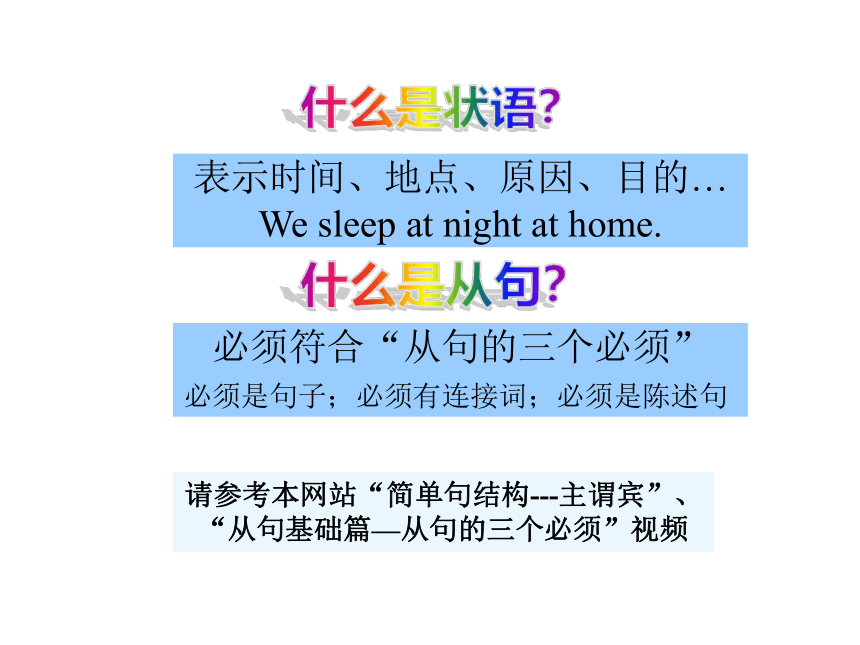
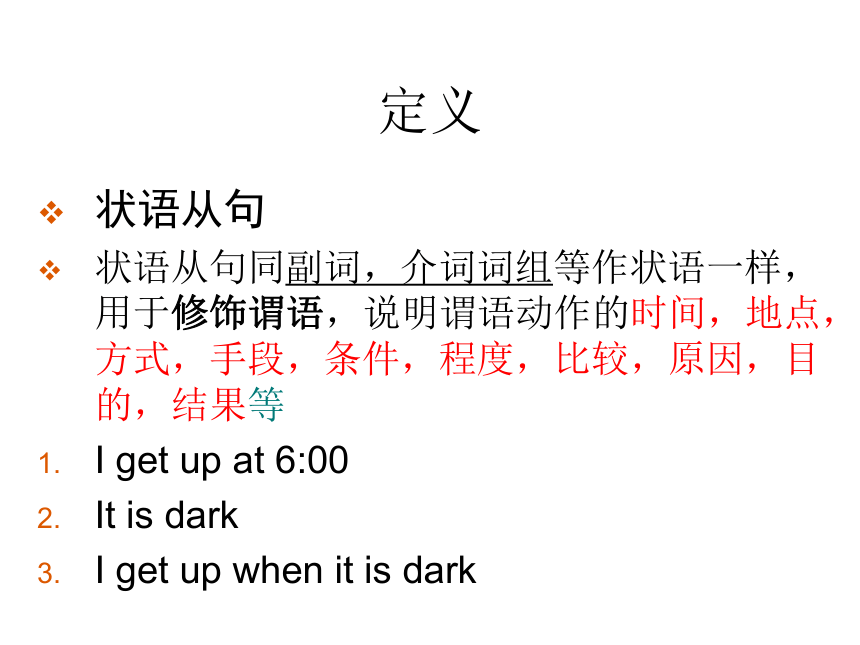
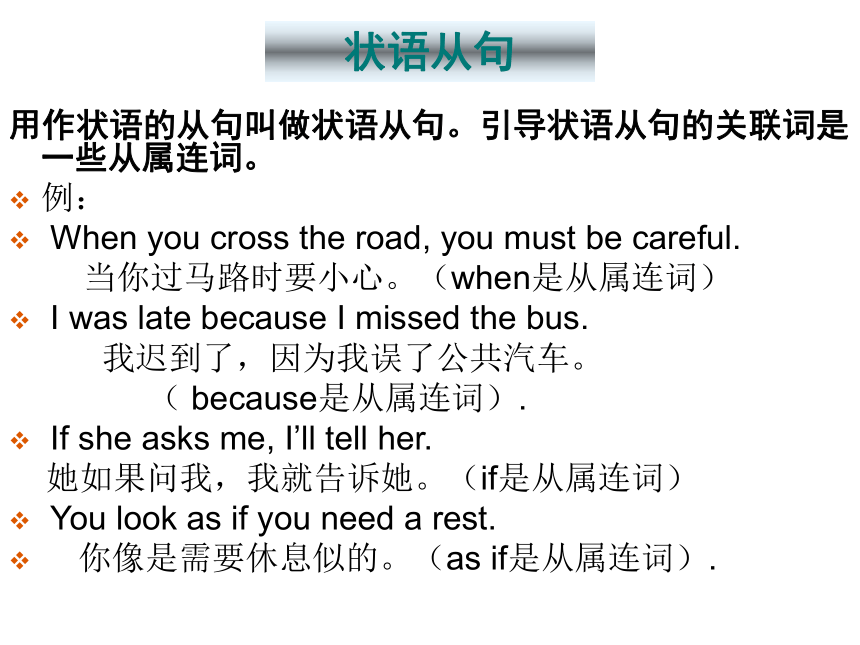
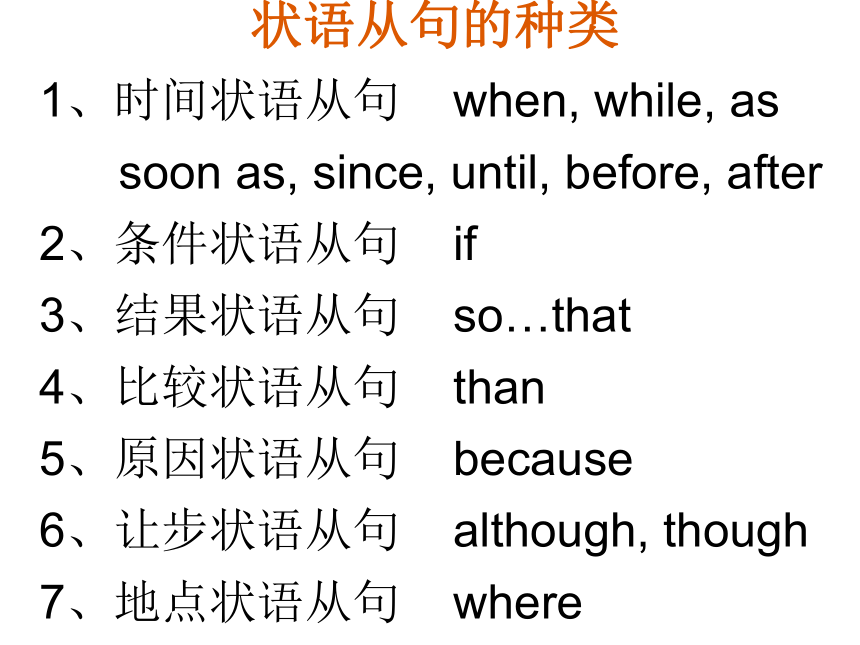
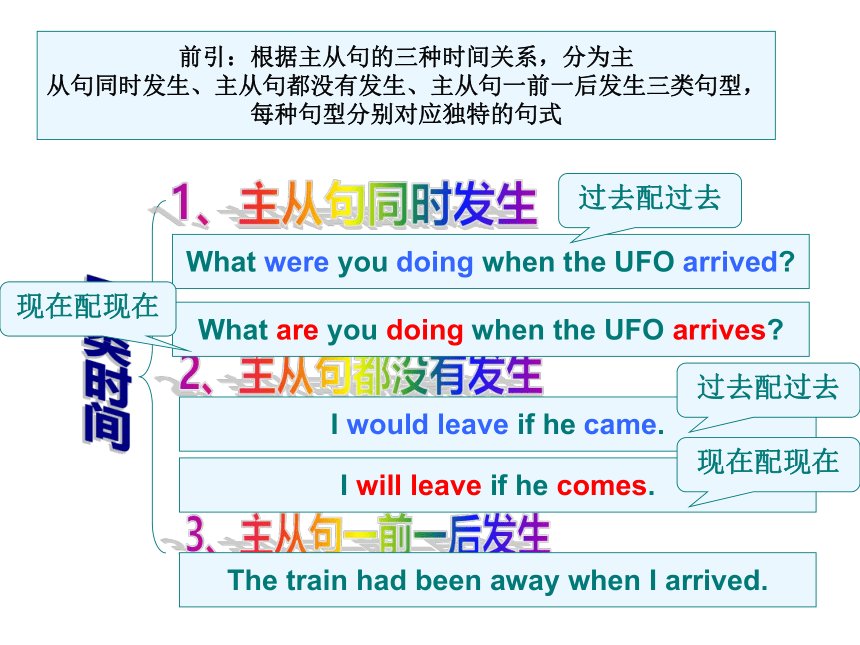
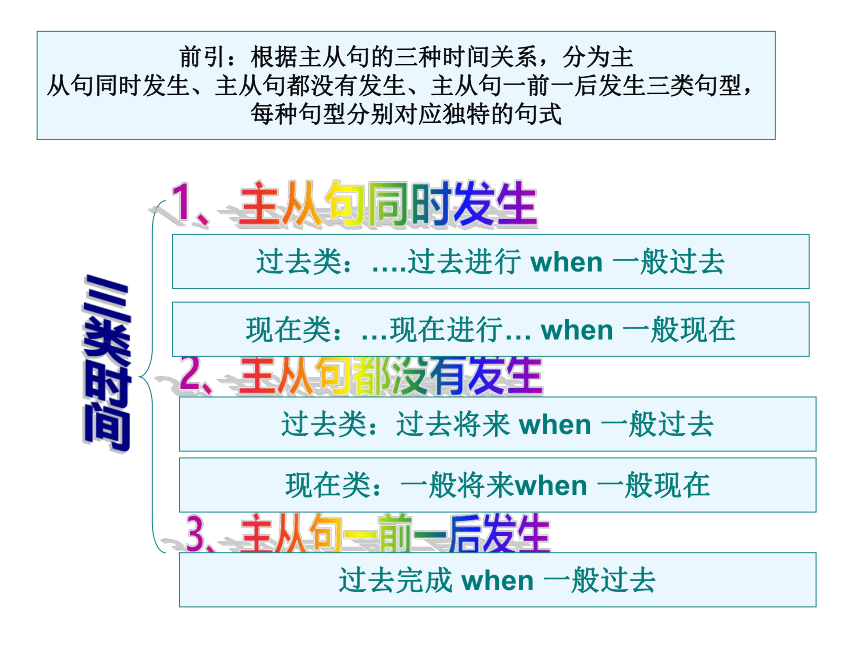
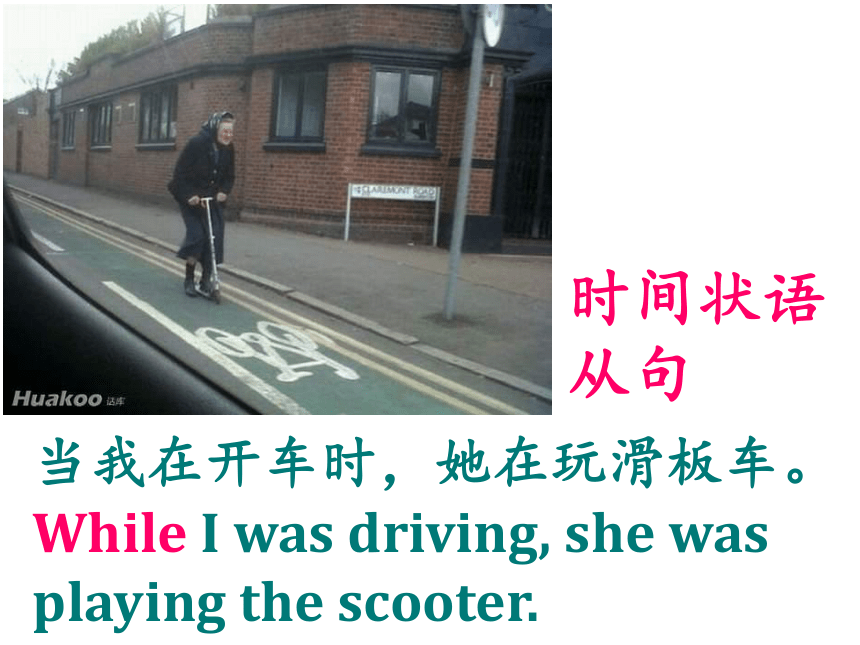
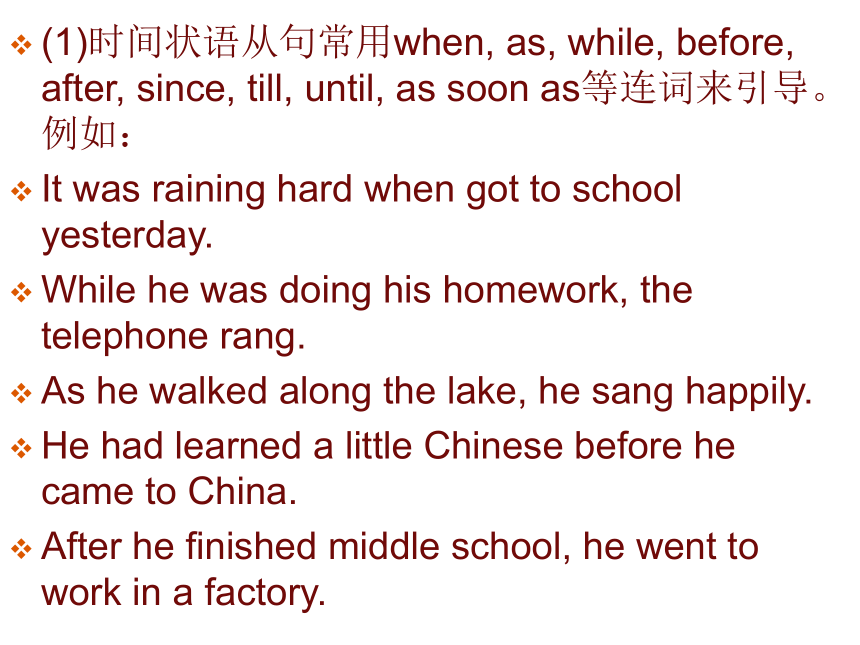
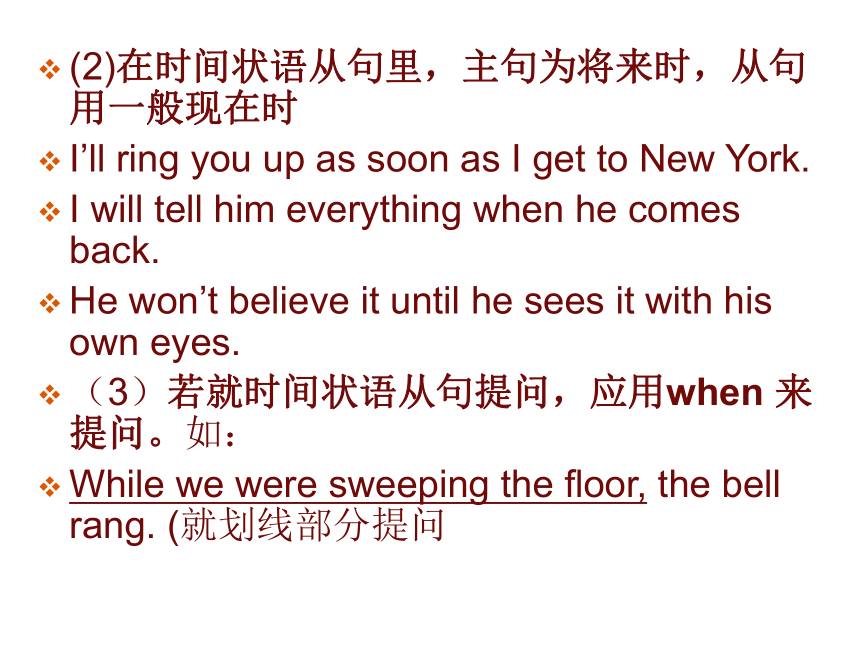
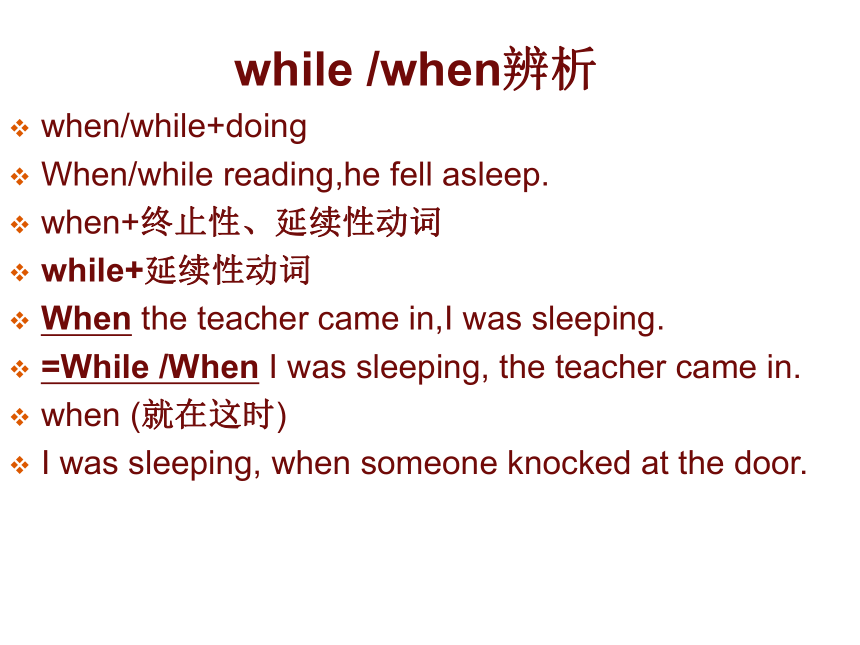
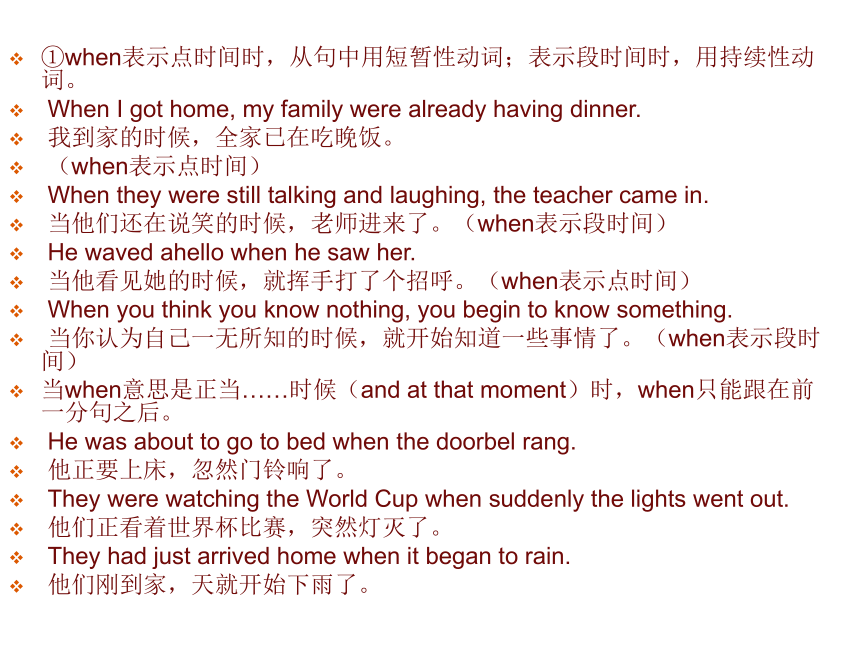
文档简介
课件68张PPT。状 语 从 句讲 练 什么是状语?什么是从句?表示时间、地点、原因、目的…
We sleep at night at home.必须符合“从句的三个必须”
必须是句子;必须有连接词;必须是陈述句 请参考本网站“简单句结构---主谓宾”、
“从句基础篇—从句的三个必须”视频定义状语从句
状语从句同副词,介词词组等作状语一样,用于修饰谓语,说明谓语动作的时间,地点,方式,手段,条件,程度,比较,原因,目的,结果等
I get up at 6:00
It is dark
I get up when it is dark用作状语的从句叫做状语从句。引导状语从句的关联词是一些从属连词。
例:
When you cross the road, you must be careful.
当你过马路时要小心。(when是从属连词)
I was late because I missed the bus.
我迟到了,因为我误了公共汽车。
( because是从属连词).
If she asks me, I’ll tell her.
她如果问我,我就告诉她。(if是从属连词)
You look as if you need a rest.
你像是需要休息似的。(as if是从属连词).状语从句状语从句的种类
1、时间状语从句 when, while, as
soon as, since, until, before, after
2、条件状语从句 if
3、结果状语从句 so…that
4、比较状语从句 than
5、原因状语从句 because
6、让步状语从句 although, though
7、地点状语从句 where前引:根据主从句的三种时间关系,分为主
从句同时发生、主从句都没有发生、主从句一前一后发生三类句型,
每种句型分别对应独特的句式三类时间1、主从句同时发生2、主从句都没有发生3、主从句一前一后发生What were you doing when the UFO arrived?What are you doing when the UFO arrives?I would leave if he came.I will leave if he comes.The train had been away when I arrived.过去配过去过去配过去现在配现在现在配现在前引:根据主从句的三种时间关系,分为主
从句同时发生、主从句都没有发生、主从句一前一后发生三类句型,
每种句型分别对应独特的句式三类时间1、主从句同时发生2、主从句都没有发生3、主从句一前一后发生过去类:….过去进行 when 一般过去现在类:…现在进行… when 一般现在过去类:过去将来 when 一般过去现在类:一般将来when 一般现在过去完成 when 一般过去当我在开车时,她在玩滑板车。
While I was driving, she was playing the scooter.时间状语
从句(1)时间状语从句常用when, as, while, before, after, since, till, until, as soon as等连词来引导。例如:
It was raining hard when got to school yesterday.
While he was doing his homework, the telephone rang.
As he walked along the lake, he sang happily.
He had learned a little Chinese before he came to China.
After he finished middle school, he went to work in a factory.
(2)在时间状语从句里,主句为将来时,从句用一般现在时
I’ll ring you up as soon as I get to New York.
I will tell him everything when he comes back.
He won’t believe it until he sees it with his own eyes.
(3)若就时间状语从句提问,应用when 来提问。如:
While we were sweeping the floor, the bell rang. (就划线部分提问 while /when辨析
when/while+doing
When/while reading,he fell asleep.
when+终止性、延续性动词
while+延续性动词
When the teacher came in,I was sleeping.
=While /When I was sleeping, the teacher came in.
when (就在这时)
I was sleeping, when someone knocked at the door.①when表示点时间时,从句中用短暂性动词;表示段时间时,用持续性动词。
When I got home, my family were already having dinner.
我到家的时候,全家已在吃晚饭。
(when表示点时间)
When they were still talking and laughing, the teacher came in.
当他们还在说笑的时候,老师进来了。(when表示段时间)
He waved ahello when he saw her.
当他看见她的时候,就挥手打了个招呼。(when表示点时间)
When you think you know nothing, you begin to know something.
当你认为自己一无所知的时候,就开始知道一些事情了。(when表示段时间)
当when意思是正当……时候(and at that moment)时,when只能跟在前一分句之后。
He was about to go to bed when the doorbel rang.
他正要上床,忽然门铃响了。
They were watching the World Cup when suddenly the lights went out.
他们正看着世界杯比赛,突然灯灭了。
They had just arrived home when it began to rain.
他们刚到家,天就开始下雨了。 ①while通常表示一段时间,从句中宜用持续性动词作谓语。
Strike while the iron is hot.
趁热打铁。
She fell asleep while she was reading the newspaper.
她在看报的时候睡着了。
②while有时可以作并列连词,表示对比,可译成……而……。
I am fond of English while he likes maths.
我喜欢英语而他却喜欢数学。
We slept while the captain kept watch.
我们睡觉而上尉担任警戒。※while 的其他含义:
While I was walking down the street, I came across an old friend. ( while =_______)
He likes pop music, while I am fond of folk music. ( while =_______)
While I really don’t like art, I find his work impressive. (while=___________)
While there is life there is hope. (while=_______________)
whenalthoughas long as but※ as : 当…时;一边…一边;随着……*某事一发生,另一事立即发生
*两个动作同时发生As the day went on, the weather got
worse.As the captain passed me, I asked
him whether there was any hope of
saving the ship.____________he?had?finished?his?homework,he?took?a?short?rest.
____________he walked along the lake, he sang happily.
____________ she was typing the letter,the telephone rang
when, as, while区别
①when
②while
③asWhenAsWhile"时间点""延续性动词"“一边..........一边”"时间段""终止性动词"※ before ① 在……前
It will be half a year before I come back.
It won’t be half a year before we meet again.
We sailed four days and nights before we saw the land.
We hadn’t run a mile before he felt tired. ④肯定句 “ 才” 否定句 “就”②it will be +一段时间 before......多久之后才...③it won’t be +一段时间 before......不久就....※till, until和not…until:
1.until/till引导时间状语从句用于肯定句时,主句的动词是延续性动词,表示动作或状态一直持续到until/till所表示的时间,意为“某动作一直延续到某时间点才停止”。如:
We waited until he came.
2.用于否定句时,主句谓语动词是非延续性动词,从句为肯定,意为“某动作直到某时间才开始”。如He won’t go to bed till/until she returns.
练一练1.?______ he comes here tomorrow, I will call you.
2.?________ he was walking in the street, he met Tim.
3.?She sang ____she worked.
4.?There was an applause
_______________________she appeared on the stage.WhenWhile/Whenasas soon as5.It won’t be long ______he finishes his writing.
6.______ he had finished his work, he left there.
7.It is two years ______he came here.
8.??_______she told me, I had no idea of what they had said .beforeAftersinceEvery time/each timeUntil 练习 :
1. I’ll write to you _______ I get there. A. while B. before C. as soon as D. by
2. He has lived in the city _________ he came back from America. A. when B. before C. since D. after
3. We won’t leave here _______ our teacher comes back. A. until B. since C. after D. as soon as
4. I had to finish the picture ________ my mother came back. A. until B. before C. after D. while
5. John fell asleep ________ he was listening to the music. A. after B. before C. while D. as soon as
中考题型时间状语从句2. 地点状语从句
地点状语从句由 where, wherever 等引导。例如:
You can take a walk wherever you like to.
---Mom, what did your doctor say?
--- He advised me to live where the air is fresher?
我扁你是因为你又偷我的菜。
I beat you because you stole my vegetables again.原因状语
从句 3. 原因状语从句
原因状语从句通常由because, as, since, now that, considering (that), seeing (that)等词引导。
because语气较强,用以回答why问句
as语气较弱,较口语化,所表示的原因较明显。
since语气较弱,常表对方已知的事实,相当于汉语的“既然”。
1.? _________he was ill, he didn’t go to school.
2._______ you do not understand, I will explain again.
3.? As she was late for class, she had to say sorry.
4.? He must be ill, _____he is absent today.BecauseSinceNow thatfor练一练6. I eat potatoes _________I like them.
我吃土豆是因为我喜欢土豆。
7. ____I didn’t know the way, I asked a policeman.
我由于不知道路,因而问警察。
8. _______you won’t help me, I’ll ask someone else.
你既然不帮我,那我就请别人帮我。becauseAsSince 1. I didn’t buy the dictionary yesterday ______ my aunt would give me one. A. until B. because C. if D before
2. ---- Why did you come to school late this morning?
----- ______ I watched the football World Cup until 12 o’clock last night. A. If B. Because C. Since D. Though 中考题型√√总结: 重点掌握because 的用法 (注: because 和so 不能同时用在一个句子中)原因状语从句他是一个如此搞笑的人以至于我们大家都笑啦。
He is such a funny man that we all laugh .结果状语从句4. 结果状语从句
结果状语从句常用so that, such that等关联词引导。e.g.
He is so young that he can’t go to work.
他如此小以致于他不能上班。
He got so little pay that his family had to live on welfare money.
他工资很少,他的家人不得不靠救济金生活。
It’s such a good chance that we mustn’t miss it. 机会这样好,我们决不能失掉。so that, so…that, such…that so that “以便”、“结果”表目的和结果。
注意:在从句中有情态动词表目的。无情态动词表结果。 so…that “如此的…以致于”表结果。该结构常见于: 1.so+形/副+that 2.so+形+a(an)+单数名词+that 3.so+many/much+复数名词(不可数名词)+that
such…that “如此的…以致于”表结果。该结构常见于: 1.such+a(an)+形+名词+that 2.such+形+复数名词/不可数名词+thatso that既可引导目的状语从句,又可引导结果状语从句。区别这两种从句的办法有两个:1)目的状语从句里往往带有情态动词can, could, may, might等。2)从意思上看,目的状语从句往往表示的目的很明确。例如:
Speak clearly so that they may understand you. (目的状语从句)
Jack is badly ill so that he has to rest. (结果状语从句)It was such a wonderful film that all of us wanted to see it again.
=The film was so wonderful that all of us wanted to see it again.
It is such an important match that nobody wants to miss it.
=The match is so important that nobody wants to miss it.
He had such long arms that he could almost touch the ceiling.
Soon there were so many deer that they ate up all the wild roses.
He has so little time that he can’t go to the cinema with you.
记:注:名词前由many, much, little, few等词修饰时,用so,不用such我做这个动作是为了站稳。
I do this action in order that I can stand still.目的状语从句 5. 目的状语从句
目的状语从句常由so that, in order that等词引导,目的状语从句常用助动词may(might), shall(should), will(would), can (could)。目的状语从句常放于主句之后,例:
Speak clearly so that they may understand you. 你要讲得清楚,他们才听得懂。
He spoke slowly in order that everyone should understand.
他讲得很慢以便人人能听懂。
They set out early ________________ they might arrive there in time.
Take your raincoat ________it should rain.
The boy hid himself behind the tree
__________________his father should see him.so that (in order that)in casein case/for fear that练一练4. I’d like to arrive 20 minutes early _______ I can have time for a cup of tea.
A. as soon as B. as a result
C. in case D. so that
5. You'd better take something to read when you go to see the doctor ______ you have to wait.
A. even if B. as if
C. in case D. in order thatIf the roaches don't die,
I'll die.条件状语从句不许动,除非我允许你动。
Don't move unless I allow you to move.主将从现
He won't be late unless he is ill.
Hurry up, or you'll be late.
=If you don't hurry up,you'll be late.
“祈使句 + and (or)+ 陈述句” =条从
Study hard and you will pass the exam.
=If you study hard, you will pass the exam. 6. 条件状语从句
条件状语从句表示条件,关联词常用if或unless,
as (so) long as. if , once, as/so long as,as far as,unless等。
If it snows tomorrow, we will build a snowman.
明天如果下雪,我们就堆雪人。
You’ll catch a cold unless you put on your coat.
你会感冒的除非你穿上大衣。
He will do anything as long as it is interesting.
只要有趣,他什么都愿意干。1. ___ you touch an English
person, you should say “sorry”.
2. ______ they are dirty, certain
seas are not able to clean themselves.
3. __________we don’t lose heart,
we’ll find a way to overcome the difficulty.
4. __________I know you shouldn’t
have any problem there.IfOnceAs long asAs far as练一练
You’ll be late ______ you don’t get up early tomorrow morning. A. if B. when C. before D. until
If he ______ on time, we will go without him A. doesn’t come B. don’t come C. didn’t come
If you _______ him tomorrow, please ask him if he ______ to work on the farm with us. A. see ; goes B. will see; goes C. will see; will go D. see; will go中考题型总结: 条件状语从句考的频率比较高,主要考查if 连词和if引导的从句与主句的时态(主将从现)条件状语从句如果是否 7. 让步状语从句
让步状语从句,表示“虽然,尽管,即使”等概念,常用的关联词有:though, although, even though等。
Though he was ill, he was still working.
他虽然有病,但仍然继续工作。
Although it is difficult, we shall do it.
此事虽难,但我们还是要做。
Even though you say so, I do not believe it.
即使你这样说,我也不信。 注: ①though和although可以互换,只是although比较正式。
②though不可以与连词but连用,但可以与yet,still连用,例:
Though he worked hard, he couldn’t pass the exam.
虽然他很努力,但还是没通过考试。 (1)让步状语从句通常由although, though等连词引导。例如:
Though he is young, he knows a lot.
Although I am tired, I must go on working.
(2)although(though)不能用在同一个句子中。例如:
我们不能说:Though it was raining hard, but he still went out.
应该说:Though it was raining hard, he still went out.或It was raining hard, but he still went out.
1. ___________________he is old ,he works hard.
2. ___________________you say so,I don’t believe it.
3. Smart ___ he is ,he doesn’t study hard.
4. The old tower must be saved, _____________ the cost.
A. however B. whatever
C. whichever D. whereverAlthough / Though Even though (even if) as练一练 8. 比较状语从句比较状语从句常用than或as…as,the more… the more等引导。than表示两者的比较,as…as表示程度相同的比较;The more…the more…表示” 越…越…”。例:
That book is more interesting than this one. 那本书比这本有趣。
He runs as fast as I (do).
他和我跑得一样快。
The more I see him , the less I like him.
我越看他就越不喜欢。1. He doesn’t work so hard ___you do.
2.The more you worry, _______you’ll succeed.
3.She did worse in the test ________she expected.asthe lessthan练一练9. 方式状语从句
方式状语从句由 as, as if , as though 等引导。例如:
You can do it as what I just did.
I couldn’t moved my legs. It was as if they were stuck to the floor.
He sounds as though he ‘s got a sore throat.注:1 ①比较状语从句后面的主语在口语中常用宾格。
②如果后面的句子主语为主格时,可以加助动词、情态动词等。
He can jump higher than I can.
他能比我跳得高。
He came later than LiLei did.
他比李磊来得晚。注:2★because of和because的区别
① because of后加名词代词或动名词,不加句子,而because加句子,例:
Because of his illness, he didn’t go to work.
因为生病,他没上班。
Because he was ill, he didn’t go to work. ②在条件和时间状语从句中,如果主句用将来时,从句常用一般现在时。
If it doesn’t rain, we’ll go fishing.
明天不下雨我们就去钓鱼。
As soon as he comes back, I’ll let him know it.
他一回来,我就让他知道这事。
③if构成条件从句时意为“如果”,可以放句首也可以放主句后;构成宾语从句时意为“是否”,一般放主句后。 例如: I don’t know if he will come tomorrow.(宾从)
我不知道他明天是否来。
If he comes, I’ll tell you.(I’ll tell you if he comes.)
如果他来,我会告诉你。 I will give the ticket to him _________________ (我一见到他)
The foreign friends have visited a lot of cities ______________________ (自从他们到中国以来)
Mr Green won’t go __________________. (直到你回来)
I could ride a bike _____________________. (当我10岁时)
I began to do some drawing ________________________ (我完成作业后)
He has to send his daughter to school _______________________ (他上班之前)as soon as I see him since they came to Chinauntil you come backwhen I was 10 years oldafter I finished my homeworkbefore he goes to work1. 他一到家,我就告诉他这件事。 I will tell him about it ____________________
2. 我喜欢吃苹果,因为这对我的健康有好处。 I like to eat apples ______________________________
3. 他和汤姆跑的一样快。 He ________________ Tom.
4. Jack太穷,他买不起这本书。 ___________________ couldn’t buy the book.
5. 直到爸爸回来他才读完这本书。 ___________________________________ his father came back.
根据中文完成句子 He didn’t finish reading the book untilbecause it’s good for my health. runs as fast as Jack was so poor that he as soon as he gets home.【模拟试题】(答题时间:50分钟) ( )1. Did he tell you __________ at the school gate?
A. who he waited for B. who is he waiting
C. who did he wait for D. who he was waiting
( )2. Do you know _______________?
A. who is he B. what he is
C. what is he D. who he isA D( )3. I don’t know ____________.
A. where does he come from
B. where he does come from
C. where he come from
D. where he comes from
( )4. —Excuse me. Could you tell me _________ get to the plane?
—Certainly. Go straight along here.
A. how can we B. how we can
C. where can we D. where we can D B( )5. The teacher asked the new student ____________ class he was in.
A. which B. where
C. how D. when
( )6. Do you know ___________ after school every day?
A. what does he do
B. he does what
C. what he does
D. does he do what
A C( )7. Have you decided __________ with me?
A. who will you go B. who will go
C. who went D. who did you go
( )8. He asked me ________________.
A. who did kick the first goal in the World Cup
B. when was the APEC meeting held
C. when China became a member of the WTO
D. where will the 2008 Olympic be held B C( )9. Kate has gone to Shanghai and I don’t know _____ tomorrow.
A. when she calls me B. when she will call me
C. when does she call me D. when will she call me
( )10. —Where does he come from?
—Pardon?
—I asked where __________.
A. did he come from B. he came from
C. he comes from D. does he come from( )11. I didn’t know ___________ at the meeting yesterday.
A. what to say B. to say what
C. why to say D. to say why B A B( )12. Could you tell me _________?
A. what time the plane leaves
B. what time the plane leave
C. what time did the plane leave
D. what time will the plane leave
( )13. Do you know _________ she knows it?
A. what B. if C. when D. what
( )14. Boys and girls, did you hear ____ I said?
A. that B. what C. it D. those
( )15. You must remember _____.
A. what your teacher said
B. what did your teacher say
C. your teacher said what
D. what has your teacher saidB BA A( )16. I watched that man for a long time and wanted to know _____.
A. whether I have seen him before B. where I had seen him before
C. that I had seen him before D. when did I see him
( )17. —Do you know ______?
—Sorry, I don’t know. You may ask the woman over there.
A. when the shop opens B. when is the shop open
C. when does the shop open D. when will the shop open
( )18. —Do you know why she _____Mr. Wang tomorrow?
—She has changed her mind.
A. won’t visit B. didn’t visit C. doesn’t visit D. hasn’t visit A A B( )19. Could you tell me ____ with the broken window?
A. what I should do B. what should I do
C. how to d D. how I should do
( )20. —Do you know ______?
—They moved here soon after their son was born.
A. when would the Greens move here
B. when the Greens moved here
C. the Greens would move here
D. when the Greens would move here
( )21. I don’t know when he ______ back from England.
A. will come B. come C. comes D. coming B A A( )22. —What did your son say in the letter?
—He told me that he ____ the Disney World the next day.
A. will visit B. has visited
C. is going to visit D. would visit
( )23. If he _____harder next time, he will catch up with us.
A. work B. worked C. works D. will work
( )24. I think WeiHua will be very happy when she _____your presents.
A. looks B. will look C. receives D. will receive CC D( )25. We’ll set out as soon as our monitor _____.
A. come B. comes
C. will come D. has come
( )26. I’ll go with you if it _______fine tomorrow.
A. has been B. is C. will be D. be
( )27. I’ll meet him at the station when he _______.
A. will return B. return C. returns D. returned
( )28. I won’t go to see the film tonight, because I _______ my ticket.
A. lost B. have lost C. will lost D. didn’t have B B C B( )29. —Are you going to visit the farm tomorrow?
—Yes. But if it _____, we’ll stay at school.
A. rain B. rained C. rains D. will rain
( )30. Please don’t stand up in class until you ______.
A. were told to B. are told to
C. were told D. are told
( )31. They won’t be back until the work _____.
A . do B. does C. is done D. will do
( )32. Xiao Ming will come and play with me if he _____busy.
A. is B. won’t be C. isn’t D. will be BC C C( )33. I will let you know about it as soon as I _________the news.
A. will get B. get C. got D. get
( )34. Though he is ill, ________he is still working hard.
A. but B. yet C. too D. either
( )35. He was late _______ the heavy rain.
A. because B. because of C. though D. if
( )36. He is ______ excited that he can’t speak any thing.
A. too B. to C. so D. enough
( )37. The boy is ______ lovely that we all like him.
A. so B. such C. too D. very B C A D B( )38. This is _____ an interesting book that I want to read it again.
A. so B. such C. quite D. very
( )39. He got up early _______ he could catch up with the others.
A. in order to B. To C. so that D. that
( )40. Our school is ______yours.
A. as three times large as B. as large three times as
C. three times as large as D. as large three times as
( )41. I wonder if he _______. If he _______, I’ll ask him to drive me there.
A. comes, comes B. come, come
C. will come, comes D. come, will come
C C CB
We sleep at night at home.必须符合“从句的三个必须”
必须是句子;必须有连接词;必须是陈述句 请参考本网站“简单句结构---主谓宾”、
“从句基础篇—从句的三个必须”视频定义状语从句
状语从句同副词,介词词组等作状语一样,用于修饰谓语,说明谓语动作的时间,地点,方式,手段,条件,程度,比较,原因,目的,结果等
I get up at 6:00
It is dark
I get up when it is dark用作状语的从句叫做状语从句。引导状语从句的关联词是一些从属连词。
例:
When you cross the road, you must be careful.
当你过马路时要小心。(when是从属连词)
I was late because I missed the bus.
我迟到了,因为我误了公共汽车。
( because是从属连词).
If she asks me, I’ll tell her.
她如果问我,我就告诉她。(if是从属连词)
You look as if you need a rest.
你像是需要休息似的。(as if是从属连词).状语从句状语从句的种类
1、时间状语从句 when, while, as
soon as, since, until, before, after
2、条件状语从句 if
3、结果状语从句 so…that
4、比较状语从句 than
5、原因状语从句 because
6、让步状语从句 although, though
7、地点状语从句 where前引:根据主从句的三种时间关系,分为主
从句同时发生、主从句都没有发生、主从句一前一后发生三类句型,
每种句型分别对应独特的句式三类时间1、主从句同时发生2、主从句都没有发生3、主从句一前一后发生What were you doing when the UFO arrived?What are you doing when the UFO arrives?I would leave if he came.I will leave if he comes.The train had been away when I arrived.过去配过去过去配过去现在配现在现在配现在前引:根据主从句的三种时间关系,分为主
从句同时发生、主从句都没有发生、主从句一前一后发生三类句型,
每种句型分别对应独特的句式三类时间1、主从句同时发生2、主从句都没有发生3、主从句一前一后发生过去类:….过去进行 when 一般过去现在类:…现在进行… when 一般现在过去类:过去将来 when 一般过去现在类:一般将来when 一般现在过去完成 when 一般过去当我在开车时,她在玩滑板车。
While I was driving, she was playing the scooter.时间状语
从句(1)时间状语从句常用when, as, while, before, after, since, till, until, as soon as等连词来引导。例如:
It was raining hard when got to school yesterday.
While he was doing his homework, the telephone rang.
As he walked along the lake, he sang happily.
He had learned a little Chinese before he came to China.
After he finished middle school, he went to work in a factory.
(2)在时间状语从句里,主句为将来时,从句用一般现在时
I’ll ring you up as soon as I get to New York.
I will tell him everything when he comes back.
He won’t believe it until he sees it with his own eyes.
(3)若就时间状语从句提问,应用when 来提问。如:
While we were sweeping the floor, the bell rang. (就划线部分提问 while /when辨析
when/while+doing
When/while reading,he fell asleep.
when+终止性、延续性动词
while+延续性动词
When the teacher came in,I was sleeping.
=While /When I was sleeping, the teacher came in.
when (就在这时)
I was sleeping, when someone knocked at the door.①when表示点时间时,从句中用短暂性动词;表示段时间时,用持续性动词。
When I got home, my family were already having dinner.
我到家的时候,全家已在吃晚饭。
(when表示点时间)
When they were still talking and laughing, the teacher came in.
当他们还在说笑的时候,老师进来了。(when表示段时间)
He waved ahello when he saw her.
当他看见她的时候,就挥手打了个招呼。(when表示点时间)
When you think you know nothing, you begin to know something.
当你认为自己一无所知的时候,就开始知道一些事情了。(when表示段时间)
当when意思是正当……时候(and at that moment)时,when只能跟在前一分句之后。
He was about to go to bed when the doorbel rang.
他正要上床,忽然门铃响了。
They were watching the World Cup when suddenly the lights went out.
他们正看着世界杯比赛,突然灯灭了。
They had just arrived home when it began to rain.
他们刚到家,天就开始下雨了。 ①while通常表示一段时间,从句中宜用持续性动词作谓语。
Strike while the iron is hot.
趁热打铁。
She fell asleep while she was reading the newspaper.
她在看报的时候睡着了。
②while有时可以作并列连词,表示对比,可译成……而……。
I am fond of English while he likes maths.
我喜欢英语而他却喜欢数学。
We slept while the captain kept watch.
我们睡觉而上尉担任警戒。※while 的其他含义:
While I was walking down the street, I came across an old friend. ( while =_______)
He likes pop music, while I am fond of folk music. ( while =_______)
While I really don’t like art, I find his work impressive. (while=___________)
While there is life there is hope. (while=_______________)
whenalthoughas long as but※ as : 当…时;一边…一边;随着……*某事一发生,另一事立即发生
*两个动作同时发生As the day went on, the weather got
worse.As the captain passed me, I asked
him whether there was any hope of
saving the ship.____________he?had?finished?his?homework,he?took?a?short?rest.
____________he walked along the lake, he sang happily.
____________ she was typing the letter,the telephone rang
when, as, while区别
①when
②while
③asWhenAsWhile"时间点""延续性动词"“一边..........一边”"时间段""终止性动词"※ before ① 在……前
It will be half a year before I come back.
It won’t be half a year before we meet again.
We sailed four days and nights before we saw the land.
We hadn’t run a mile before he felt tired. ④肯定句 “ 才” 否定句 “就”②it will be +一段时间 before......多久之后才...③it won’t be +一段时间 before......不久就....※till, until和not…until:
1.until/till引导时间状语从句用于肯定句时,主句的动词是延续性动词,表示动作或状态一直持续到until/till所表示的时间,意为“某动作一直延续到某时间点才停止”。如:
We waited until he came.
2.用于否定句时,主句谓语动词是非延续性动词,从句为肯定,意为“某动作直到某时间才开始”。如He won’t go to bed till/until she returns.
练一练1.?______ he comes here tomorrow, I will call you.
2.?________ he was walking in the street, he met Tim.
3.?She sang ____she worked.
4.?There was an applause
_______________________she appeared on the stage.WhenWhile/Whenasas soon as5.It won’t be long ______he finishes his writing.
6.______ he had finished his work, he left there.
7.It is two years ______he came here.
8.??_______she told me, I had no idea of what they had said .beforeAftersinceEvery time/each timeUntil 练习 :
1. I’ll write to you _______ I get there. A. while B. before C. as soon as D. by
2. He has lived in the city _________ he came back from America. A. when B. before C. since D. after
3. We won’t leave here _______ our teacher comes back. A. until B. since C. after D. as soon as
4. I had to finish the picture ________ my mother came back. A. until B. before C. after D. while
5. John fell asleep ________ he was listening to the music. A. after B. before C. while D. as soon as
中考题型时间状语从句2. 地点状语从句
地点状语从句由 where, wherever 等引导。例如:
You can take a walk wherever you like to.
---Mom, what did your doctor say?
--- He advised me to live where the air is fresher?
我扁你是因为你又偷我的菜。
I beat you because you stole my vegetables again.原因状语
从句 3. 原因状语从句
原因状语从句通常由because, as, since, now that, considering (that), seeing (that)等词引导。
because语气较强,用以回答why问句
as语气较弱,较口语化,所表示的原因较明显。
since语气较弱,常表对方已知的事实,相当于汉语的“既然”。
1.? _________he was ill, he didn’t go to school.
2._______ you do not understand, I will explain again.
3.? As she was late for class, she had to say sorry.
4.? He must be ill, _____he is absent today.BecauseSinceNow thatfor练一练6. I eat potatoes _________I like them.
我吃土豆是因为我喜欢土豆。
7. ____I didn’t know the way, I asked a policeman.
我由于不知道路,因而问警察。
8. _______you won’t help me, I’ll ask someone else.
你既然不帮我,那我就请别人帮我。becauseAsSince 1. I didn’t buy the dictionary yesterday ______ my aunt would give me one. A. until B. because C. if D before
2. ---- Why did you come to school late this morning?
----- ______ I watched the football World Cup until 12 o’clock last night. A. If B. Because C. Since D. Though 中考题型√√总结: 重点掌握because 的用法 (注: because 和so 不能同时用在一个句子中)原因状语从句他是一个如此搞笑的人以至于我们大家都笑啦。
He is such a funny man that we all laugh .结果状语从句4. 结果状语从句
结果状语从句常用so that, such that等关联词引导。e.g.
He is so young that he can’t go to work.
他如此小以致于他不能上班。
He got so little pay that his family had to live on welfare money.
他工资很少,他的家人不得不靠救济金生活。
It’s such a good chance that we mustn’t miss it. 机会这样好,我们决不能失掉。so that, so…that, such…that so that “以便”、“结果”表目的和结果。
注意:在从句中有情态动词表目的。无情态动词表结果。 so…that “如此的…以致于”表结果。该结构常见于: 1.so+形/副+that 2.so+形+a(an)+单数名词+that 3.so+many/much+复数名词(不可数名词)+that
such…that “如此的…以致于”表结果。该结构常见于: 1.such+a(an)+形+名词+that 2.such+形+复数名词/不可数名词+thatso that既可引导目的状语从句,又可引导结果状语从句。区别这两种从句的办法有两个:1)目的状语从句里往往带有情态动词can, could, may, might等。2)从意思上看,目的状语从句往往表示的目的很明确。例如:
Speak clearly so that they may understand you. (目的状语从句)
Jack is badly ill so that he has to rest. (结果状语从句)It was such a wonderful film that all of us wanted to see it again.
=The film was so wonderful that all of us wanted to see it again.
It is such an important match that nobody wants to miss it.
=The match is so important that nobody wants to miss it.
He had such long arms that he could almost touch the ceiling.
Soon there were so many deer that they ate up all the wild roses.
He has so little time that he can’t go to the cinema with you.
记:注:名词前由many, much, little, few等词修饰时,用so,不用such我做这个动作是为了站稳。
I do this action in order that I can stand still.目的状语从句 5. 目的状语从句
目的状语从句常由so that, in order that等词引导,目的状语从句常用助动词may(might), shall(should), will(would), can (could)。目的状语从句常放于主句之后,例:
Speak clearly so that they may understand you. 你要讲得清楚,他们才听得懂。
He spoke slowly in order that everyone should understand.
他讲得很慢以便人人能听懂。
They set out early ________________ they might arrive there in time.
Take your raincoat ________it should rain.
The boy hid himself behind the tree
__________________his father should see him.so that (in order that)in casein case/for fear that练一练4. I’d like to arrive 20 minutes early _______ I can have time for a cup of tea.
A. as soon as B. as a result
C. in case D. so that
5. You'd better take something to read when you go to see the doctor ______ you have to wait.
A. even if B. as if
C. in case D. in order thatIf the roaches don't die,
I'll die.条件状语从句不许动,除非我允许你动。
Don't move unless I allow you to move.主将从现
He won't be late unless he is ill.
Hurry up, or you'll be late.
=If you don't hurry up,you'll be late.
“祈使句 + and (or)+ 陈述句” =条从
Study hard and you will pass the exam.
=If you study hard, you will pass the exam. 6. 条件状语从句
条件状语从句表示条件,关联词常用if或unless,
as (so) long as. if , once, as/so long as,as far as,unless等。
If it snows tomorrow, we will build a snowman.
明天如果下雪,我们就堆雪人。
You’ll catch a cold unless you put on your coat.
你会感冒的除非你穿上大衣。
He will do anything as long as it is interesting.
只要有趣,他什么都愿意干。1. ___ you touch an English
person, you should say “sorry”.
2. ______ they are dirty, certain
seas are not able to clean themselves.
3. __________we don’t lose heart,
we’ll find a way to overcome the difficulty.
4. __________I know you shouldn’t
have any problem there.IfOnceAs long asAs far as练一练
You’ll be late ______ you don’t get up early tomorrow morning. A. if B. when C. before D. until
If he ______ on time, we will go without him A. doesn’t come B. don’t come C. didn’t come
If you _______ him tomorrow, please ask him if he ______ to work on the farm with us. A. see ; goes B. will see; goes C. will see; will go D. see; will go中考题型总结: 条件状语从句考的频率比较高,主要考查if 连词和if引导的从句与主句的时态(主将从现)条件状语从句如果是否 7. 让步状语从句
让步状语从句,表示“虽然,尽管,即使”等概念,常用的关联词有:though, although, even though等。
Though he was ill, he was still working.
他虽然有病,但仍然继续工作。
Although it is difficult, we shall do it.
此事虽难,但我们还是要做。
Even though you say so, I do not believe it.
即使你这样说,我也不信。 注: ①though和although可以互换,只是although比较正式。
②though不可以与连词but连用,但可以与yet,still连用,例:
Though he worked hard, he couldn’t pass the exam.
虽然他很努力,但还是没通过考试。 (1)让步状语从句通常由although, though等连词引导。例如:
Though he is young, he knows a lot.
Although I am tired, I must go on working.
(2)although(though)不能用在同一个句子中。例如:
我们不能说:Though it was raining hard, but he still went out.
应该说:Though it was raining hard, he still went out.或It was raining hard, but he still went out.
1. ___________________he is old ,he works hard.
2. ___________________you say so,I don’t believe it.
3. Smart ___ he is ,he doesn’t study hard.
4. The old tower must be saved, _____________ the cost.
A. however B. whatever
C. whichever D. whereverAlthough / Though Even though (even if) as练一练 8. 比较状语从句比较状语从句常用than或as…as,the more… the more等引导。than表示两者的比较,as…as表示程度相同的比较;The more…the more…表示” 越…越…”。例:
That book is more interesting than this one. 那本书比这本有趣。
He runs as fast as I (do).
他和我跑得一样快。
The more I see him , the less I like him.
我越看他就越不喜欢。1. He doesn’t work so hard ___you do.
2.The more you worry, _______you’ll succeed.
3.She did worse in the test ________she expected.asthe lessthan练一练9. 方式状语从句
方式状语从句由 as, as if , as though 等引导。例如:
You can do it as what I just did.
I couldn’t moved my legs. It was as if they were stuck to the floor.
He sounds as though he ‘s got a sore throat.注:1 ①比较状语从句后面的主语在口语中常用宾格。
②如果后面的句子主语为主格时,可以加助动词、情态动词等。
He can jump higher than I can.
他能比我跳得高。
He came later than LiLei did.
他比李磊来得晚。注:2★because of和because的区别
① because of后加名词代词或动名词,不加句子,而because加句子,例:
Because of his illness, he didn’t go to work.
因为生病,他没上班。
Because he was ill, he didn’t go to work. ②在条件和时间状语从句中,如果主句用将来时,从句常用一般现在时。
If it doesn’t rain, we’ll go fishing.
明天不下雨我们就去钓鱼。
As soon as he comes back, I’ll let him know it.
他一回来,我就让他知道这事。
③if构成条件从句时意为“如果”,可以放句首也可以放主句后;构成宾语从句时意为“是否”,一般放主句后。 例如: I don’t know if he will come tomorrow.(宾从)
我不知道他明天是否来。
If he comes, I’ll tell you.(I’ll tell you if he comes.)
如果他来,我会告诉你。 I will give the ticket to him _________________ (我一见到他)
The foreign friends have visited a lot of cities ______________________ (自从他们到中国以来)
Mr Green won’t go __________________. (直到你回来)
I could ride a bike _____________________. (当我10岁时)
I began to do some drawing ________________________ (我完成作业后)
He has to send his daughter to school _______________________ (他上班之前)as soon as I see him since they came to Chinauntil you come backwhen I was 10 years oldafter I finished my homeworkbefore he goes to work1. 他一到家,我就告诉他这件事。 I will tell him about it ____________________
2. 我喜欢吃苹果,因为这对我的健康有好处。 I like to eat apples ______________________________
3. 他和汤姆跑的一样快。 He ________________ Tom.
4. Jack太穷,他买不起这本书。 ___________________ couldn’t buy the book.
5. 直到爸爸回来他才读完这本书。 ___________________________________ his father came back.
根据中文完成句子 He didn’t finish reading the book untilbecause it’s good for my health. runs as fast as Jack was so poor that he as soon as he gets home.【模拟试题】(答题时间:50分钟) ( )1. Did he tell you __________ at the school gate?
A. who he waited for B. who is he waiting
C. who did he wait for D. who he was waiting
( )2. Do you know _______________?
A. who is he B. what he is
C. what is he D. who he isA D( )3. I don’t know ____________.
A. where does he come from
B. where he does come from
C. where he come from
D. where he comes from
( )4. —Excuse me. Could you tell me _________ get to the plane?
—Certainly. Go straight along here.
A. how can we B. how we can
C. where can we D. where we can D B( )5. The teacher asked the new student ____________ class he was in.
A. which B. where
C. how D. when
( )6. Do you know ___________ after school every day?
A. what does he do
B. he does what
C. what he does
D. does he do what
A C( )7. Have you decided __________ with me?
A. who will you go B. who will go
C. who went D. who did you go
( )8. He asked me ________________.
A. who did kick the first goal in the World Cup
B. when was the APEC meeting held
C. when China became a member of the WTO
D. where will the 2008 Olympic be held B C( )9. Kate has gone to Shanghai and I don’t know _____ tomorrow.
A. when she calls me B. when she will call me
C. when does she call me D. when will she call me
( )10. —Where does he come from?
—Pardon?
—I asked where __________.
A. did he come from B. he came from
C. he comes from D. does he come from( )11. I didn’t know ___________ at the meeting yesterday.
A. what to say B. to say what
C. why to say D. to say why B A B( )12. Could you tell me _________?
A. what time the plane leaves
B. what time the plane leave
C. what time did the plane leave
D. what time will the plane leave
( )13. Do you know _________ she knows it?
A. what B. if C. when D. what
( )14. Boys and girls, did you hear ____ I said?
A. that B. what C. it D. those
( )15. You must remember _____.
A. what your teacher said
B. what did your teacher say
C. your teacher said what
D. what has your teacher saidB BA A( )16. I watched that man for a long time and wanted to know _____.
A. whether I have seen him before B. where I had seen him before
C. that I had seen him before D. when did I see him
( )17. —Do you know ______?
—Sorry, I don’t know. You may ask the woman over there.
A. when the shop opens B. when is the shop open
C. when does the shop open D. when will the shop open
( )18. —Do you know why she _____Mr. Wang tomorrow?
—She has changed her mind.
A. won’t visit B. didn’t visit C. doesn’t visit D. hasn’t visit A A B( )19. Could you tell me ____ with the broken window?
A. what I should do B. what should I do
C. how to d D. how I should do
( )20. —Do you know ______?
—They moved here soon after their son was born.
A. when would the Greens move here
B. when the Greens moved here
C. the Greens would move here
D. when the Greens would move here
( )21. I don’t know when he ______ back from England.
A. will come B. come C. comes D. coming B A A( )22. —What did your son say in the letter?
—He told me that he ____ the Disney World the next day.
A. will visit B. has visited
C. is going to visit D. would visit
( )23. If he _____harder next time, he will catch up with us.
A. work B. worked C. works D. will work
( )24. I think WeiHua will be very happy when she _____your presents.
A. looks B. will look C. receives D. will receive CC D( )25. We’ll set out as soon as our monitor _____.
A. come B. comes
C. will come D. has come
( )26. I’ll go with you if it _______fine tomorrow.
A. has been B. is C. will be D. be
( )27. I’ll meet him at the station when he _______.
A. will return B. return C. returns D. returned
( )28. I won’t go to see the film tonight, because I _______ my ticket.
A. lost B. have lost C. will lost D. didn’t have B B C B( )29. —Are you going to visit the farm tomorrow?
—Yes. But if it _____, we’ll stay at school.
A. rain B. rained C. rains D. will rain
( )30. Please don’t stand up in class until you ______.
A. were told to B. are told to
C. were told D. are told
( )31. They won’t be back until the work _____.
A . do B. does C. is done D. will do
( )32. Xiao Ming will come and play with me if he _____busy.
A. is B. won’t be C. isn’t D. will be BC C C( )33. I will let you know about it as soon as I _________the news.
A. will get B. get C. got D. get
( )34. Though he is ill, ________he is still working hard.
A. but B. yet C. too D. either
( )35. He was late _______ the heavy rain.
A. because B. because of C. though D. if
( )36. He is ______ excited that he can’t speak any thing.
A. too B. to C. so D. enough
( )37. The boy is ______ lovely that we all like him.
A. so B. such C. too D. very B C A D B( )38. This is _____ an interesting book that I want to read it again.
A. so B. such C. quite D. very
( )39. He got up early _______ he could catch up with the others.
A. in order to B. To C. so that D. that
( )40. Our school is ______yours.
A. as three times large as B. as large three times as
C. three times as large as D. as large three times as
( )41. I wonder if he _______. If he _______, I’ll ask him to drive me there.
A. comes, comes B. come, come
C. will come, comes D. come, will come
C C CB
同课章节目录
- 词法
- 名词
- 动词和动词短语
- 动词语态
- 动词时态
- 助动词和情态动词
- 非谓语动词
- 冠词
- 代词
- 数词和量词
- 形容词副词及其比较等级
- 介词和介词短语
- 连词和感叹词
- 构词法
- 相似、相近词比较
- 句法
- 陈述句
- 一般疑问句和否定疑问句
- 特殊疑问句及选择疑问句
- 反意疑问句
- 存在句(There be句型)
- 宾语从句
- 定语从句
- 状语从句
- 主谓一致问题
- 简单句
- 并列句
- 复合句
- 主谓一致
- 主、表语从句
- 名词性从句
- 直接引语和间接引语
- 虚拟语气
- 感叹句
- 强调句
- 倒装句
- 祈使句
- 句子的成分
- 句子的分类
- 题型专区
- 单项选择部分
- 易错题
- 完形填空
- 阅读理解
- 词汇练习
- 听说训练
- 句型转换
- 补全对话
- 短文改错
- 翻译
- 书面表达
- 任务型阅读
- 语法填空
- 其他资料
